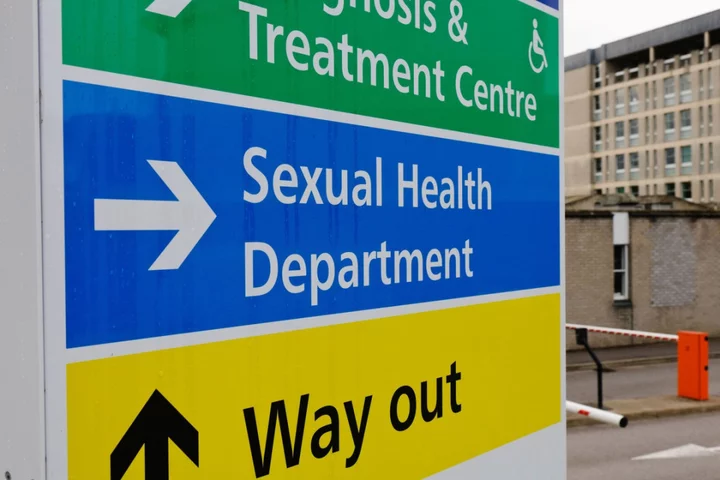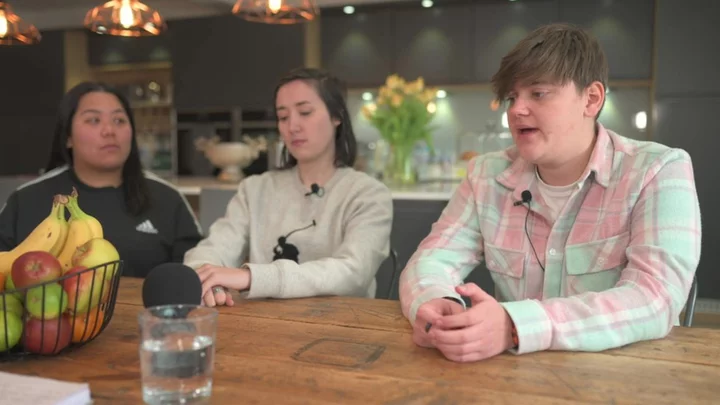
STI cases at record highs: 6 things everyone needs to know about sexually transmitted infections
Cases of gonorrhoea in England have reached record highs, while syphilis cases are at the highest level since just after the Second World War, according to the UK Health Security Agency (UKHSA). Gonorrhoea diagnoses rose to 82,592 in 2022, an increase of 50.3% compared to 2021, while infectious syphilis cases increased to 8,692 in 2022, the largest annual number since 1948. As well as gonorrhoea and syphilis, it’s important to be aware of the risk around all sexually transmitted infections (STIs) including chlamydia, genital herpes, genital warts and HIV. As Dr Hamish Mohammed, consultant epidemiologist at UKHSA, pointed out: “STIs aren’t just an inconvenience – they can have a major impact on your health and that of any sexual partners.” Here, sexual health experts talk through what you need to know about STI prevention, testing and treatment… 1. Anyone can potentially get an STI “Don’t think that because you haven’t caught one in the past – or because you only sleep with people that you don’t think have STIs – that you are immune, because the truth is that no one is,” Sarah Mulindwa, a specialist sexual health nurse who is working with Lovehoney, told PA Media. Regardless of gender, sexual orientation, whether you have lots of partners or you’re in a monogamous relationship, anyone can potentially get an STI. And they affect all age groups, too. “There’s no upper age limit on getting an STI,” Julie Bowring, consultant gynaecologist in sexual and reproductive health at London Gynaecology, added. The number of common STIs caught among the over 65s in the UK increased by 20% from 2017 to 2019, according to the Local Government Association. This may in part be due to differences in health awareness. “When that generation of patients were at school, they didn’t get quite as good and comprehensive sexual health education as we get now,” Bowring said. “And if you look at all the media campaigns for sexual health infections, it’s usually targeted at a younger demographic.” 2. Not all contraceptives protect against all STIs “It’s a common myth that when you’re on regular contraception, you might have protection against STIs,” said Bowring. “I think that can sometimes be missing in information that’s given to patients when they start contraception.” While birth control methods such as the pill, coil or IUD will protect against unintended pregnancy, they won’t protect against STIs. “Condoms [or dental dams] are the only effective method of protecting against STIs if you are sexually active,” said Mulindwa. “And even then, only when you use them correctly: wearing one to cover the whole length of the penis, and using from start to finish of sex, including during oral, anal, or vaginal penetration.” 3. Symptoms can vary greatly With a wide range of symptoms that vary in severity, STIs can sometimes be difficult to spot. “Certain STIs, such as chlamydia for example, might not even present any symptoms in the person that has it,” Mulindwa explained. “If you are experiencing any form of discomfort in and around your genitals, then it is imperative that you get tested right away.” Other signs may include an unusual discharge from the vagina, penis or anus; pain when peeing; lumps or skin growths around the genitals or anus; a rash; unusual vaginal bleeding; itchy genitals or anus; and blisters, sores or warts around these areas. “It can be quite difficult for women to sometimes know when a symptom might be STI related,” added Bowring. “It could be their periods, it could be something non-STI related. If there is a risk of infection and you have noticed a change in either your discharge or your pain, then it is worth getting checked out.” 4. Routine testing is a good idea Because some infections don’t result in any symptoms, routine testing is important. “If you’ve changed partner then it’s a good idea, if you haven’t had STI screening, to attend your local service to get that done,” Bowring advised. Home testing kits are also available with swabs and finger-prick blood tests. “It’s recommended that you screen at least every six months for the most common infections – chlamydia and gonorrhoea – and yearly for blood tests to screen for HIV, syphilis, and hepatitis C,” Mulindwa added. “Depending on your risk factors, you may need to screen more frequently.” 5. Treatments are available STIs are extremely common and there’s no need to feel embarrassed or ashamed if you do catch one, and treatments are available. “The majority of STIs are curable, and even those that aren’t – for example, herpes – have treatments available to manage outbreaks,” said Mulindwa. “Some STIs like chlamydia are treatable with a course of antibiotics, and others require creams and ointments.” 6. Options for people with HIV have come a long way Thanks to scientific breakthroughs, providing they have access to treatment, most people with HIV will not develop any AIDS-related illnesses and can live full lives. “There are now options available that can stop HIV reproducing in the body and prevent you from passing it on, as well as drugs designed to prevent infection if you have been exposed,” said Mulindwa. “People who are HIV positive and are undetectable (which means the level of the virus is very low) are unable to pass it on even when they have unprotected sex.” A relatively new drug called Pre-Exposure Prophylaxis (PrEP) – designed to reduce the chance of contracting HIV – can be helpful for people who may be at increased risk. Health professionals at NHS sexual health clinics can talk you through the options for preventing and managing HIV. Read More Charity boss speaks out over ‘traumatic’ encounter with royal aide Ukraine war’s heaviest fight rages in east - follow live What’s wrong with my roses? Men’s Health Week: How to talk about sensitive or ’embarrassing’ health issues Prince William responds after three guardsman collapse during UK heatwave
1970-01-01 08:00

Josh Hartnett hails 'genius filmmaker' Christopher Nolan
Josh Hartnett has loved working with Christopher Nolan on 'Oppenheimer'.
1970-01-01 08:00

Noel Gallagher gets Later... with Jools Holland special
Noel Gallagher has performed live cuts for the BBC music show.
1970-01-01 08:00

Jonnie Irwin explains why he hasn’t told sons about his terminal cancer: ‘Let’s bury our heads in the sand’
Jonnie Irwin has opened up about why he hasn’t told his three children that he has terminal cancer. The A Place in the Sun presenter, 49, publicly revealed his diagnosis in November 2022 after his lung cancer spread to his brain. However, his young sons, who he shares with wife Jessica Holmes, do not know that their father is dying. Irwin says it would be difficult for them to understand his situation at this age: his eldest son Rex is four-and-a-half, while twins Rafa and Cormac are turning three this month. In a new interview with Hello! magazine ahead of Father’s Day, Irwin said: “I keep being asked, ‘Are you going to tell them?’ but tell them what? “It would be horrible news that they’d have to get their heads around. And it would confuse the hell out of Rex – he’s got a shocking enough day coming. Let’s bury our heads in the sand for as long as possible.” In the meantime, Irwin and Holmes are trying to give their children a sense of normalcy by continuing to teach and play with them. Holmes described the presenter as a “great dad and a big kid himself”, adding: “All the boys gravitate to him when they want to show off and get his attention. They’re aware that Jonnie needs his rest and can’t always jump up and play football for hours, but they’re more than happy snuggled up on the sofa, watching a movie. “Story time is a big thing at bedtime and that is something I know Jonnie treasures with them.” In November, when Irwin first revealed his diagnosis, he said Rex “doesn’t need to know” about his illness yet. “We make fun of my hair – he calls it my ‘spiky head’ – but as far as he’s concerned, his dad is normal and why would I shatter that innocence?” Earlier this month, Irwin was admitted to hospital to be “monitored” as his treatment continues. He shared in an Instagram post that he was admitted to keep an eye on a “changeover in my pain management regime”. In an appearance on the OneChat podcast by insurer AIG Life, Irwin said he had been close to dying “at least twice”. “You lose your memory, you lose your patience. I have got a very short temper. It’s not made me a better person, that’s for sure,” he admitted. However, Irwin emphasised that he prefers to think of his situation as “living with cancer, rather than dying from cancer”. Read More A Place In The Sun’s Jonnie Irwin admitted to hospital amid terminal diagnosis Jonnie Irwin says he’s been ‘close to death’s door twice, at least’ Jonnie Irwin says going public with terminal cancer diagnosis was day he began ‘living again’
1970-01-01 08:00

Sharon Horgan says she has PTSD from daughter’s health scare
Sharon Horgan has opened up about having post-traumatic stress disorder (PTSD) after her eldest daughter was diagnosed with meningitis as a baby. The Irish actor, who will star in the forthcoming BBC One drama Best Interests with Michael Sheen, said she drew on the experience in order to play her character in the new series. Horgan’s daughter survived the life-threatening illness, but it left an “aftershock” on her mother. “We were so unbelievably lucky and we know that,” the Bad Sisters star told The Times in a new interview, published today (Sunday 11 June). “But the aftershock – there’s definitely PTSD and I dealt with any of my second daughter’s illnesses with blind panic because you always think, ‘If it can happen, why couldn’t it happen again?’” Both of Horgan’s daughters, Sadhbh and Amer, are now teenagers. She shares them with her ex-husband, Jeremy Rainbird. Best Interests tells the story of Nicci (Horgan), a mother who sues the NHS after doctors decide her Marnie (Niamh Moriarty) should be taken off life support after her condition, muscular dystrophy, deteriorates. Horgan stars opposite Sheen, who plays Nicci’s husband Andrew. In the show, Andrew is torn between his love for Marnie and his unwillingness to support his wife’s case. The friction between Nicci and Andrew shows that they “had a real relationship that has difficulties”, Horgan said. “When things get really, really bad, the accusations are there, a certain amount of finger-pointing, which happens anyway, just even in normal parenting,” she explained. After her divorce from Rainbird in 2019, Horgan said the adjustment to co-parenting made her doubt if she was a good mother. During an appearance on Desert Island Discs in 2020, she told host Lauren Laverne: “I was fun mum for years. I entirely thought that was my role but that changes when you co-parent. “Everything changes and you take on a lot more roles and I am much more practical than I was, and I think that is a positive thing.” She continued: “It had some dips in the middle where I thought, ‘Oh, that thing I thought I was, which was a good mother, I am not entirely sure about’. “When you bring anything like that into your kid’s life it’s tricky, when you turn the roles upside down, but it balances out and everything eased back.” Read More Shapewear is booming, and body image experts are worried: ‘It’s really dangerous’ Chris Hemsworth thanks wife Elsa Pataky for her ‘forgiveness’ Kelis addresses Bill Murray dating rumours for the first time Sharon Horgan opens up about ‘aftershock’ after daughter’s meningitis Jamie Foxx’s rep addresses conspiracy Covid vaccine left actor ‘paralyzed and blind’ Debate sparker over parent who wouldn’t give her daughter any birthday cake
1970-01-01 08:00

Novo Nordisk Plans $2.3 Billion Manufacturing Expansion in Denmark
Novo Nordisk A/S is spending 15.9 billion Danish kroner ($2.29 billion) to expand production facilities in Denmark as
1970-01-01 08:00

Wales adoptees hope to break taboo of identity struggle
A podcast featuring Welsh adoptees aims to tackle myths about adoption.
1970-01-01 08:00

Novartis Agrees to Buy Chinook for Up to $3.5 Billion
Novartis AG agreed to buy Chinook Therapeutics Inc. for as much as $3.5 billion to add two promising
1970-01-01 08:00

Twickenham veteran runs ultra-marathon across Tanzania
Tricia Sinclair hopes to raise £30,000 for a charity which helps rehabilitate veterans through sport.
1970-01-01 08:00

Biparjoy: India state on alert over 'extremely severe' cyclone
Cyclone Biparjoy is likely to hit parts of India's Gujarat state on 15 June, the weather office has said.
1970-01-01 08:00

Cricket helps us feel at home in Scottish Borders - refugees
Teenagers who fled Afghanistan have told the BBC playing the sport in Galashiels has made their time easier.
1970-01-01 08:00

Colombia plane crash: Mum told children to leave her and get help
The children's mother survived for four days after the plane crashed in the jungle.
1970-01-01 08:00
